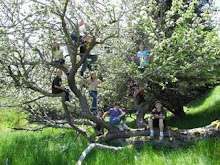
Island Readers and Writers always offers us a chance to do wonderful programs with authors and illustrators. They've taken it one step farther, now, by teaming up with Vanderbilt University's Aspirnaut Program to offer literature links to science instruction. We've been reading two wonderful books: We Can't All Be Rattlesnakes and The Evolution of Calpurnia Tate. Both of these children's books deal with natural selection and Darwin's Evolution of the Species. The second part of the program is to meet with actual scientists from Vanderbilt over our Polycom.

Here is our new friend, a scientist at the University, Stephanie Zeiger. She took us through a lesson on how birds' beaks evolve over time to better adapt to their food sources. We had several kinds of beans and several kinds of implements that would serve as our beaks. The kids were then timed to see how many beans they could gather in two minutes.

Chaos ensued. There were beans flipping all over the place. They LOVED it.

Of course, some implements were easier than others. I hope that I don't ever get stuck as a bird with a beak like chopsticks.

All in all, the data we gathered showed that lima beans were easiest to gather, and that the spoon was the most successful implement. The second round, everyone switched their implements, but we saw a marked increase in all the implements success due to the learning process everyone went through. This brought up a great discussion about adaptations and evolution of species from generation to generation. A great thanks to Jan Coates from IRW and to Dr. Zeiger from Vanderbilt!
 Island Readers and Writers always offers us a chance to do wonderful programs with authors and illustrators. They've taken it one step farther, now, by teaming up with Vanderbilt University's Aspirnaut Program to offer literature links to science instruction. We've been reading two wonderful books: We Can't All Be Rattlesnakes and The Evolution of Calpurnia Tate. Both of these children's books deal with natural selection and Darwin's Evolution of the Species. The second part of the program is to meet with actual scientists from Vanderbilt over our Polycom.
Island Readers and Writers always offers us a chance to do wonderful programs with authors and illustrators. They've taken it one step farther, now, by teaming up with Vanderbilt University's Aspirnaut Program to offer literature links to science instruction. We've been reading two wonderful books: We Can't All Be Rattlesnakes and The Evolution of Calpurnia Tate. Both of these children's books deal with natural selection and Darwin's Evolution of the Species. The second part of the program is to meet with actual scientists from Vanderbilt over our Polycom.  Here is our new friend, a scientist at the University, Stephanie Zeiger. She took us through a lesson on how birds' beaks evolve over time to better adapt to their food sources. We had several kinds of beans and several kinds of implements that would serve as our beaks. The kids were then timed to see how many beans they could gather in two minutes.
Here is our new friend, a scientist at the University, Stephanie Zeiger. She took us through a lesson on how birds' beaks evolve over time to better adapt to their food sources. We had several kinds of beans and several kinds of implements that would serve as our beaks. The kids were then timed to see how many beans they could gather in two minutes.  Chaos ensued. There were beans flipping all over the place. They LOVED it.
Chaos ensued. There were beans flipping all over the place. They LOVED it. Of course, some implements were easier than others. I hope that I don't ever get stuck as a bird with a beak like chopsticks.
Of course, some implements were easier than others. I hope that I don't ever get stuck as a bird with a beak like chopsticks. All in all, the data we gathered showed that lima beans were easiest to gather, and that the spoon was the most successful implement. The second round, everyone switched their implements, but we saw a marked increase in all the implements success due to the learning process everyone went through. This brought up a great discussion about adaptations and evolution of species from generation to generation. A great thanks to Jan Coates from IRW and to Dr. Zeiger from Vanderbilt!
All in all, the data we gathered showed that lima beans were easiest to gather, and that the spoon was the most successful implement. The second round, everyone switched their implements, but we saw a marked increase in all the implements success due to the learning process everyone went through. This brought up a great discussion about adaptations and evolution of species from generation to generation. A great thanks to Jan Coates from IRW and to Dr. Zeiger from Vanderbilt!


No comments:
Post a Comment